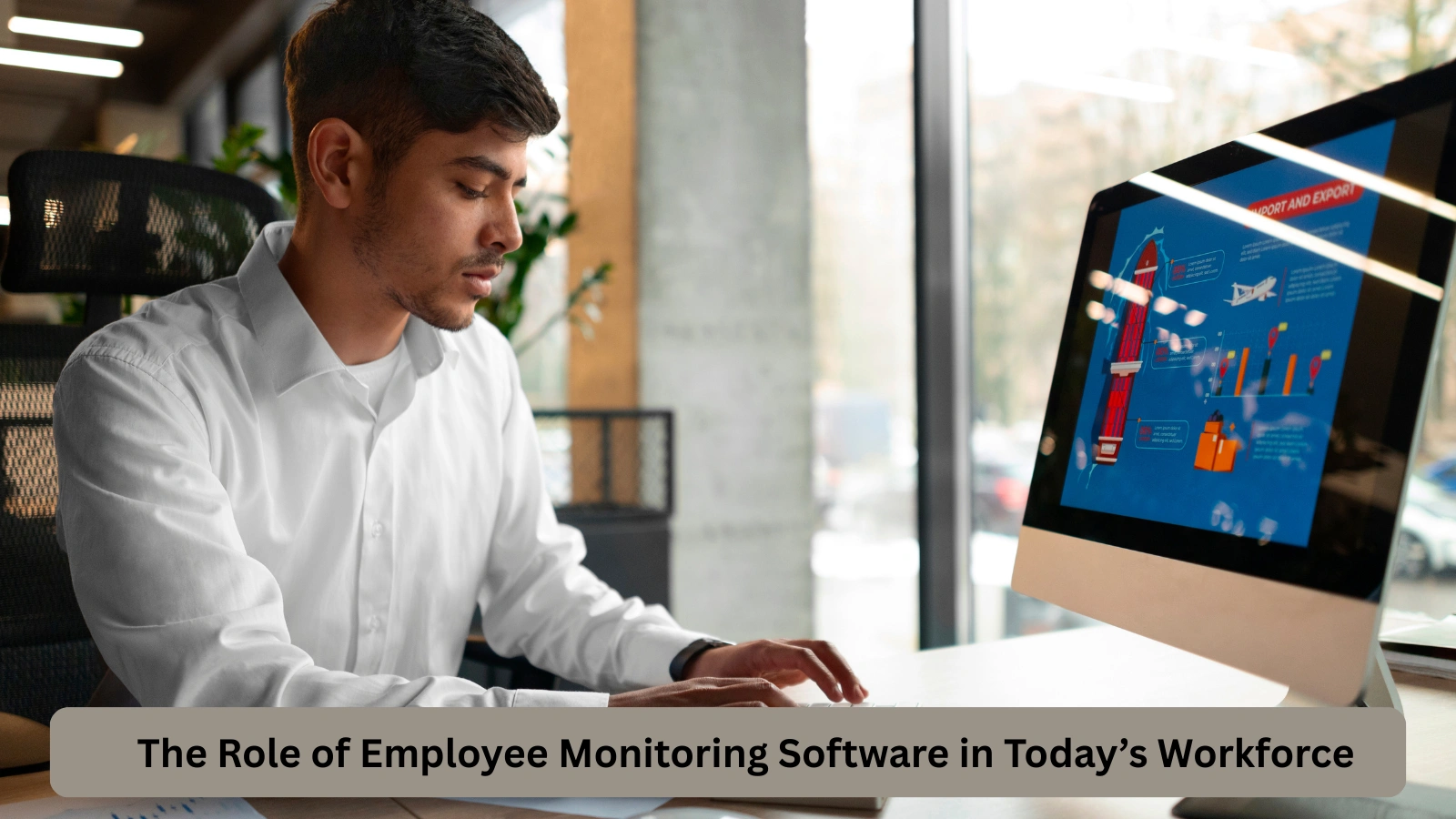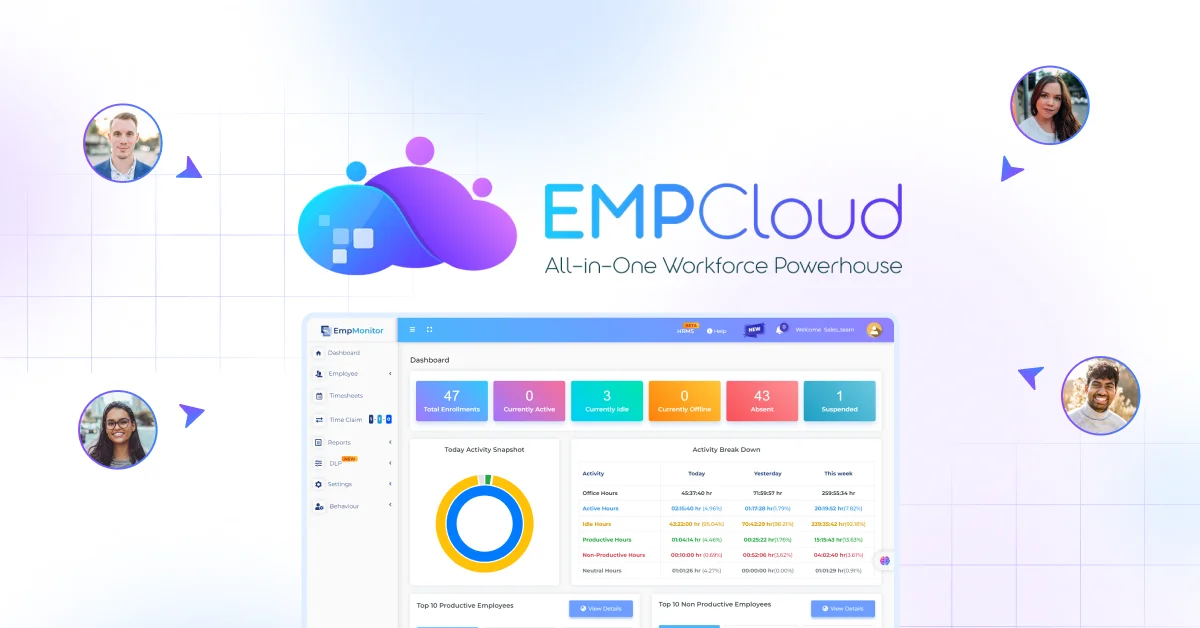
Workplaces thrive when employees feel valued and trusted, yet businesses also need visibility into performance, productivity, and workflow efficiency. As remote and hybrid work environments become the norm, organizations rely more heavily on monitoring tools to track employee activities and meet performance goals. However, this shift has raised deeper concerns about employee monitoring ethics, pushing companies to rethink their approach to data collection and oversight.
The key question is not whether companies should monitor employees but how they should implement monitoring practices responsibly. Employees want assurance that their privacy is respected and that employee monitoring ethics guide every decision. Employers who adopt clear guidelines, transparent policies, and fair systems not only stay compliant with regulations but also build stronger trust within teams.
This blog explores the ethical foundations of workplace monitoring, offers practical steps to balance oversight with respect, and highlights how tools like EmpCloud help businesses create ethical and trustworthy monitoring systems.
Listen To The Podcast Now!
Understanding The Ethics Of Employee Monitoring In Modern Workplaces
Employee monitoring ethics center on fairness, privacy, and communication. Monitoring is essential to improve workflow, detect inefficiencies, and secure company data, but employees may perceive it as an invasion of privacy if not handled thoughtfully. Ethical monitoring involves complete transparency, which is a core principle of employee monitoring ethics. Employees should clearly understand:
- What data is being collected?
- How their activity is measured.
- Why are these tools in place?
A company that embraces employee monitoring ethics and ethical monitoring practices sets the stage for a culture of trust. Rather than using tools solely to track performance, businesses can use them to identify areas of support, training needs, and workload imbalances. When communicated correctly, ethical monitoring feels like a partnership rather than surveillance.
Key Principles Behind The Ethics Of Employee Monitoring
Every organization must follow guiding principles to create a healthy balance between business needs and employee rights. Strong policies built on employee monitoring ethics ensure that monitoring tools serve as growth enablers rather than sources of tension.
Here are three crucial principles:
Transparency:
Transparency builds trust and minimizes uncertainty. Employees should know exactly why monitoring is in place, what data is collected, and how it will be used. Clear communication prevents rumors or negative assumptions about tracking practices. When companies remain open, employees feel more secure and cooperative, reinforcing employee monitoring ethics in the workplace.
Consent:
Obtaining consent from employees demonstrates respect for their individual rights and privacy. Employees should have the opportunity to review company monitoring policies, ask questions, and provide feedback before implementation. Obtaining written consent helps prevent legal disputes and promotes ethical practices. Consent also reassures employees that monitoring is not a hidden agenda but a well-structured process, further strengthening employee monitoring ethics.
Fairness:
Monitoring should never target individuals or teams unfairly. Consistent application across the organization ensures that every employee feels equally valued and respected. Favoritism or uneven tracking creates resentment, lowers morale, and leads to distrust. Fair policies transform monitoring into a growth tool instead of a source of workplace tension.
By following these principles, organizations turn monitoring tools into productivity enhancers rather than instruments of micromanagement.
The Role Of Employee Monitoring Software In Today’s Workforce
Technology has transformed how organizations manage their teams, and employee monitoring software has become a cornerstone of modern workforce operations. These tools allow companies to track attendance, application usage, project progress, and productivity trends in real time. They also help detect security threats, prevent data leaks, and ensure resources are distributed effectively. When combined with employee monitoring ethics, this software shifts from a surveillance tool to a driver of trust and collaboration.
The purpose of this software goes beyond surveillance. It’s about giving managers the insights they need to make smarter decisions, improve workflows, and create a supportive environment for employees. Employee monitoring ethics ensure these tools are used with fairness and transparency, making them valuable assets rather than sources of distrust.
For example:
Managers can identify departments struggling with workloads and provide extra resources:
By analyzing productivity reports, managers can pinpoint teams or individuals facing overwhelming workloads. This allows them to redistribute tasks, hire additional support, or adjust deadlines before stress turns into burnout. Such proactive measures demonstrate employee monitoring ethics in action, showing employees that tracking exists to help, not to penalize.
HR teams can streamline performance reviews with accurate activity records:
Monitoring software provides reliable data on attendance, project timelines, and work output, giving HR teams a clear view of employee contributions. This makes performance reviews more objective and fair, removing biases or assumptions. By aligning reviews with employee monitoring ethics, businesses create a culture of trust and meritocracy.
IT teams can use monitoring data to improve security protocols:
Monitoring software helps IT departments identify suspicious activity, detect unauthorized access, and protect company data. By flagging unusual behavior early, businesses can prevent costly security breaches and safeguard sensitive information. This security-first approach reflects employee monitoring ethics, balancing company protection with employee privacy.
When combined with ethical practices, this technology becomes a powerful driver of employee engagement and growth. Instead of feeling like they are under surveillance, employees can use monitoring insights to track their own performance, set personal goals, and take pride in their achievements. Organizations that integrate employee monitoring ethics into their policies foster trust, innovation, and long-term loyalty.
Challenges Companies Face In Maintaining Ethical Monitoring Practices
Even the best monitoring strategies come with challenges. Employers must address these hurdles to maintain a culture of fairness and trust:
- Privacy Concerns: Employees fear that constant tracking may blur boundaries between work and personal time.
- Data Misuse Risks: Poor handling of sensitive information can damage trust and lead to legal trouble.
- Cultural Differences: What feels acceptable in one region may not align with privacy norms in another.
- Employee Resistance: Teams may feel uncomfortable with monitoring if they don’t understand its purpose.
Overcoming these issues requires a combination of strong leadership, transparent communication, and advanced tools that respect privacy.
Read More!
How To Improve Efficiency With Real Time Employee Tracking
How To Conduct An Employee Performance Review Effectively?
How Workforce Analytics Software Supports Ethical Decision-Making?
Modern organizations rely on workforce analytics software to transform raw employee data into meaningful insights. These tools go far beyond tracking basic metrics. They provide leaders with a comprehensive view of workforce performance, well-being, and trends, helping create a fairer and more supportive work environment. When used ethically, analytics ensures that decisions are based on facts, not assumptions, and that employees feel respected and valued.
For example, workforce analytics tools can:
Identify underutilized skill sets and reallocate tasks:
Analytics reveal employee strengths that may otherwise go unnoticed. Leaders can identify employees whose talents are not being fully used and assign them tasks that align with their skills. This helps individuals feel valued and engaged while ensuring the company benefits from its workforce’s full potential. Fair task allocation also minimizes frustration caused by uneven workloads.
Detect burnout risks by tracking workloads and work hours:
Analytics tools highlight patterns that indicate overwork, such as extended hours or constant overtime. With these insights, managers can step in to redistribute responsibilities, hire additional staff, or offer support to overburdened employees. This proactive approach shows employees that their health and well-being are a priority, reinforcing trust in company policies.
Measure productivity without micromanaging every click or keystroke:
Instead of intrusive tracking, analytics software focuses on big-picture trends and overall output. Leaders can evaluate productivity without invading personal privacy, building a sense of respect between management and staff. Employees feel less pressured and more empowered to meet expectations when monitoring focuses on results rather than constant scrutiny.
These actionable insights allow leaders to make fair and evidence-based decisions. By leveraging data, organizations remove bias from evaluations, create growth opportunities, and establish a culture of transparency. This makes workforce analytics software a key part of employee monitoring ethics initiatives.
Best Practices to Build Trust While Using Employee Monitoring Software
To create a transparent and positive culture around monitoring, companies should focus on strategies that build trust and promote employee growth. These best practices ensure that monitoring is seen as a supportive tool rather than a means of control, aligning every decision with employee monitoring ethics:
Create Clear Policies:
A comprehensive monitoring policy fosters trust by outlining the tools used, detailing the data collected, and clarifying the necessity of monitoring. Make the policy easy for employees to access and review, so they feel informed rather than watched. When employees understand the purpose and limits of monitoring, they are more likely to accept it, reinforcing employee monitoring ethics in the workplace.
Train Employees:
Education reduces fear and resistance. Take time to explain how employee monitoring software improves workflows, supports performance reviews, and enhances security. Training sessions should also cover data privacy measures to assure employees that their personal information remains safe. An informed workforce feels empowered instead of being micromanaged.
Focus on Growth, Not Surveillance:
Monitoring should never feel like spying. Use the data collected to help employees develop their skills, identify strengths, and improve productivity. A supportive approach shows that monitoring exists to create opportunities, not to criticize behavior. When employees see tangible benefits, trust in leadership grows.
Respect Boundaries:
Respecting privacy is essential for ethical monitoring. Avoid tracking employees’ personal devices, private messages, or after-hours activity unless it is directly related to security concerns. This approach demonstrates empathy and respect for work-life balance, which strengthens employee loyalty and morale.
Give Employees Access to Data:
Empower employees by letting them see their own metrics and performance data. This transparency helps employees take ownership of their growth and encourages open conversations about productivity. When employees have access to their data, monitoring becomes a shared tool for success rather than a top-down system.
How EmpCloud Helps Businesses Maintain Ethical Monitoring Standards
EmpCloud is a comprehensive platform designed to help organizations ethically manage employee performance, time tracking, and workflows while fostering trust. Its features are built to support transparency and employee well-being:
- Real-Time Activity Tracking: EmpCloud provides an accurate view of employee activities, enabling managers to make informed decisions without micromanaging.
- Data Privacy Controls: The platform prioritizes security, ensuring that sensitive employee data remains confidential and accessible only to authorized personnel.
- Customizable Monitoring Levels: Businesses can adjust tracking levels to respect employee privacy while meeting operational needs.
- Comprehensive Workforce Analytics: EmpCloud’s analytics engine highlights productivity trends, workload distribution, and performance bottlenecks.
- Employee Self-Access Dashboards: Employees can view their own performance data, which fosters accountability and reduces anxiety around monitoring.
By incorporating features like these, EmpCloud empowers businesses to implement employee monitoring ethics without sacrificing trust, morale, or compliance.
Legal And Compliance Aspects Of Employee Monitoring Ethics
Compliance plays a major role in employee monitoring. Different regions have different regulations, and failing to comply can lead to severe penalties. For example:
- The General Data Protection Regulation (GDPR) in Europe requires employers to justify data collection and obtain employee consent.
- The California Consumer Privacy Act (CCPA) focuses on transparency and providing individuals control over their data.
Companies must create policies that meet local legal requirements and clearly communicate them to employees. Doing so demonstrates commitment to ethical practices and strengthens the company’s credibility.
Creating A Monitoring Policy That Respects Employee Privacy
An ethical monitoring policy should balance organizational productivity goals with employee trust and well-being. A clear, well-structured policy prevents misunderstandings and sets expectations for everyone in the company. Here’s how businesses can create one:
Engage Stakeholders:
Policy creation should not happen in isolation. Involving HR teams, legal experts, managers, and employees ensures that the policy reflects multiple perspectives. Employees are more likely to accept and support monitoring when they feel their voices have been heard. Collaboration also helps ensure the policy complies with labor laws and privacy regulations.
Define Objectives:
Clearly state why monitoring is in place, whether it’s for security, productivity improvement, or regulatory compliance. This eliminates speculation and reinforces that monitoring serves a purpose rather than acting as surveillance. When employees understand the purpose behind monitoring, they are more receptive to its implementation.
Set Data Boundaries:
To maintain trust, clearly define what data will and won’t be collected. Avoid tracking personal information or irrelevant details that could make employees uncomfortable. For instance, monitoring should focus on work-related activities, not private conversations or personal devices. Setting these limits demonstrates a strong commitment to privacy.
Review Policies Regularly:
Workplaces evolve, and so should monitoring policies. Regular reviews allow organizations to adapt policies to new technologies, remote work models, or updated privacy laws. Involving employees in these updates further builds trust and ensures the policy remains relevant and fair.
Future Of Ethical Employee Monitoring: Trends And Innovations
The future of employee monitoring focuses on building trust through advanced, employee-friendly technology. Companies are moving away from invasive methods and toward solutions that create a positive workplace culture while meeting organizational needs. Here’s what you can expect in the coming years:
AI-Powered Insights:
Artificial intelligence will take workforce analytics to the next level. AI-driven platforms will analyze large volumes of data to predict workload imbalances, identify burnout risks, and highlight opportunities for skill development. These predictive insights will allow managers to take action proactively, improving employee satisfaction while optimizing productivity.
Privacy-First Tools:
As privacy regulations evolve, companies will invest in monitoring tools that collect only the data necessary for business purposes. Future platforms will focus on transparency, allowing employees to understand what’s being tracked and why. This shift will ensure organizations meet compliance requirements while earning employee trust.
Employee Empowerment Features:
Monitoring software will increasingly include features designed to help employees take ownership of their growth. Dashboards and analytics tailored for employees will enable them to track their own performance, set personal goals, and receive actionable feedback. This will transform monitoring into a career development tool rather than a source of stress.
Hybrid Work Adaptation:
With hybrid work becoming standard, monitoring solutions will adapt to support both remote and office-based employees seamlessly. These tools will focus on outcomes rather than constant oversight, helping companies create fair systems that value flexibility while safeguarding productivity.
By embracing these innovations, businesses can ensure that employee monitoring ethics remain a cornerstone of their operations. Companies that adopt trust-driven tools will foster loyalty, engagement, and long-term growth.
Conclusion
Employee monitoring ethics form the foundation of a healthy workplace culture. Companies that balance oversight with respect for privacy create environments where employees feel supported, not scrutinized. Tools like employee monitoring software and workforce analytics software simplify management tasks, but ethics ensure these tools serve employees as much as employers.
Platforms such as EmpCloud prove that ethical monitoring is possible. With customizable settings, analytics, and data privacy controls, businesses can make monitoring transparent and fair. Prioritizing employee trust leads to higher engagement, better productivity, and a stronger organizational reputation.
FAQs
- Why is employee monitoring ethics important?
It ensures that monitoring practices respect employee privacy, comply with laws, and create a culture of trust rather than fear. - How does workforce analytics software support ethical monitoring?
It offers insights into productivity and workload trends without micromanaging employees, helping leaders make fair and informed decisions. - What features make EmpCloud ethical and effective?
EmpCloud offers real-time tracking, employee dashboards, customizable monitoring levels, and privacy-first controls, which encourage transparency.






